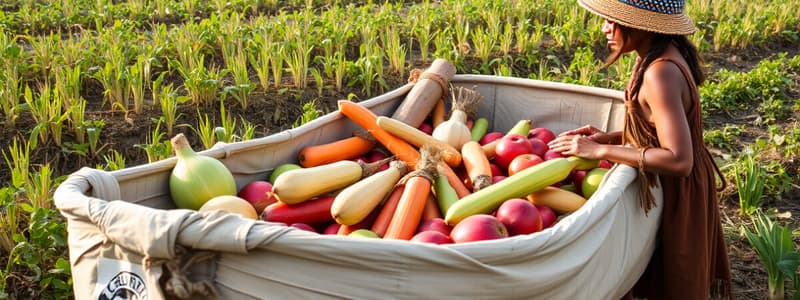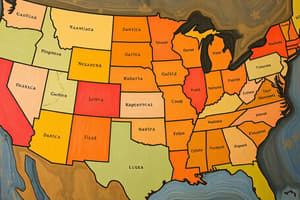Podcast
Questions and Answers
What did the southern environment provide for the Indians?
What did the southern environment provide for the Indians?
a bounty of food
The Indians developed an extensive what?
The Indians developed an extensive what?
agriculture
What was the staple crop of the Indians?
What was the staple crop of the Indians?
maize/corn
Where did the Indians store their corn?
Where did the Indians store their corn?
Why were storage granaries guarded at all costs?
Why were storage granaries guarded at all costs?
Native agriculture was supplemented by what?
Native agriculture was supplemented by what?
Native Mississippians developed many indigenous ________ and fishing techniques that are still used today.
Native Mississippians developed many indigenous ________ and fishing techniques that are still used today.
What was not native to the United States that De Soto brought over from Europe?
What was not native to the United States that De Soto brought over from Europe?
What were Spanish soldiers called?
What were Spanish soldiers called?
What did De Soto bring to feed his conquistadors?
What did De Soto bring to feed his conquistadors?
What was the dominant language of Indians in the Southeast?
What was the dominant language of Indians in the Southeast?
The southeastern Indian nation did not have a what language?
The southeastern Indian nation did not have a what language?
The southeast Indians developed a form of written communication called?
The southeast Indians developed a form of written communication called?
Pictography was a system of what?
Pictography was a system of what?
Mississippi tribes were matrilineal, which means?
Mississippi tribes were matrilineal, which means?
The Indians based their social organization on the?
The Indians based their social organization on the?
They worshipped many ________ some of whom were believed to be kind and others were believed to be ________.
They worshipped many ________ some of whom were believed to be kind and others were believed to be ________.
Their religious beliefs were closely tied to their?
Their religious beliefs were closely tied to their?
The most important ritual among the southeastern Indians was the?
The most important ritual among the southeastern Indians was the?
_________ traditions among the different Indian nations varied widely.
_________ traditions among the different Indian nations varied widely.
Only the Natchez practiced human _____ among the death of a tribal chief.
Only the Natchez practiced human _____ among the death of a tribal chief.
The Chickasaw usually bury the dead with their favorite?
The Chickasaw usually bury the dead with their favorite?
The Choctaw first laid the dead on a raised _____ to allow the body to ________.
The Choctaw first laid the dead on a raised _____ to allow the body to ________.
Specially trained people called _____ ______ remove the flesh from the skeleton before it was buried.
Specially trained people called _____ ______ remove the flesh from the skeleton before it was buried.
Among Mississippi Indians, ______ ______ and other sporting events were popular.
Among Mississippi Indians, ______ ______ and other sporting events were popular.
The most popular sport among Mississippi Indians was?
The most popular sport among Mississippi Indians was?
Most Mississippi tribes were organized by towns and?
Most Mississippi tribes were organized by towns and?
Both Choctaw and Chickasaw developed a tribal?
Both Choctaw and Chickasaw developed a tribal?
The tribal council was composed of?
The tribal council was composed of?
The mingos ruled the nation with the advice of?
The mingos ruled the nation with the advice of?
The rule of law among Mississippi Indians followed custom and?
The rule of law among Mississippi Indians followed custom and?
Important council meetings were usually opened by smoking the?
Important council meetings were usually opened by smoking the?
The three large tribes in Mississippi were?
The three large tribes in Mississippi were?
What did smaller tribes do?
What did smaller tribes do?
What did small tribes do for protection?
What did small tribes do for protection?
Migration of smaller tribes was sometimes caused by _____ on the smaller tribes by European ______ ______ or by larger tribes that were allied with slave traders.
Migration of smaller tribes was sometimes caused by _____ on the smaller tribes by European ______ ______ or by larger tribes that were allied with slave traders.
The first report to a tribe called the _______ was made in 1682 by La Salle during his voyage from the French colonies in Canada down to the Mississippi river.
The first report to a tribe called the _______ was made in 1682 by La Salle during his voyage from the French colonies in Canada down to the Mississippi river.
On the historic voyage, La Salle ____ all the land drained by the Mississippi river for France, naming it in honor of King Louis XVI.
On the historic voyage, La Salle ____ all the land drained by the Mississippi river for France, naming it in honor of King Louis XVI.
At the top of the Natchez social structure was the?
At the top of the Natchez social structure was the?
In the Natchez tribe, the Great Sun was the hereditary ______ of all the tribe.
In the Natchez tribe, the Great Sun was the hereditary ______ of all the tribe.
The Great Sun was the ______ chief but did not have binding authority over the five villages or settlement districts.
The Great Sun was the ______ chief but did not have binding authority over the five villages or settlement districts.
Villages were traditionally run by?
Villages were traditionally run by?
Natchez established villages along the?
Natchez established villages along the?
The Natchez also built several?
The Natchez also built several?
The most important sacred mound of the Natchez was called the?
The most important sacred mound of the Natchez was called the?
Colonists set out among the Natchez.
Colonists set out among the Natchez.
The French observed the Natchez's ______ of human sacrifice (when the Great Sun died).
The French observed the Natchez's ______ of human sacrifice (when the Great Sun died).
The French tried to persuade the Natchez to abandon their?
The French tried to persuade the Natchez to abandon their?
The Natchez and French were _______ toward each other.
The Natchez and French were _______ toward each other.
As the French population _____ and encroachment on ______ farmland and hunting grounds expanded, several tribal chiefs joined the Natchez in an attempt to drive the French from the _______ ______ _____.
As the French population _____ and encroachment on ______ farmland and hunting grounds expanded, several tribal chiefs joined the Natchez in an attempt to drive the French from the _______ ______ _____.
In 1729, the Natchez ______ the French at Fort Rosalie, killing about 200 Frenchmen and taking many prisoners.
In 1729, the Natchez ______ the French at Fort Rosalie, killing about 200 Frenchmen and taking many prisoners.
The next year, the French and their Choctaw allies recaptured Fort Rosalie and killed and captured most of the?
The next year, the French and their Choctaw allies recaptured Fort Rosalie and killed and captured most of the?
The ______ were the second largest nation among the southeastern Indians.
The ______ were the second largest nation among the southeastern Indians.
The Choctaw were the most _______ nation.
The Choctaw were the most _______ nation.
The Choctaw Indians were allies with the ______. They usually allied with the?
The Choctaw Indians were allies with the ______. They usually allied with the?
Who was the first European to encounter the Choctaw Indians?
Who was the first European to encounter the Choctaw Indians?
How did the Choctaw lose their land to the Europeans?
How did the Choctaw lose their land to the Europeans?
During the colonial period, the ______ were clustered in several villages called long town in North Mississippi and numbered about 4500.
During the colonial period, the ______ were clustered in several villages called long town in North Mississippi and numbered about 4500.
The Chickasaw social and political structure was ______ to the Choctaw.
The Chickasaw social and political structure was ______ to the Choctaw.
The Choctaw were more peaceful and ______ than the Chickasaw, who were ______ and _____.
The Choctaw were more peaceful and ______ than the Chickasaw, who were ______ and _____.
The Chickasaw were ______ allies.
The Chickasaw were ______ allies.
The Chickasaw were actively involved with the English and Indian?
The Chickasaw were actively involved with the English and Indian?
After the ______ attacked Fort Rosalie in 1729, the Chickasaw allowed members of the Natchez nation who escaped to live among them.
After the ______ attacked Fort Rosalie in 1729, the Chickasaw allowed members of the Natchez nation who escaped to live among them.
For the next several years, ______ officials at New Orleans and Mobile considered launching an attack against the Chickasaw for giving refuge to the Natchez.
For the next several years, ______ officials at New Orleans and Mobile considered launching an attack against the Chickasaw for giving refuge to the Natchez.
The French wanted to stop the Chickasaw from interfering with?
The French wanted to stop the Chickasaw from interfering with?
In 1736, the ______ mounted a major offensive against the Chickasaw.
In 1736, the ______ mounted a major offensive against the Chickasaw.
________ traders living among the Chickasaw taught them how to barricade their villages and prepare them for the approaching battle.
________ traders living among the Chickasaw taught them how to barricade their villages and prepare them for the approaching battle.
Even as ______ of the British, the Chickasaw could not hold back the western expansion of the English colonies from the Atlantic Ocean.
Even as ______ of the British, the Chickasaw could not hold back the western expansion of the English colonies from the Atlantic Ocean.
Eventually, the Chickasaw were forced to sell their ancestral lands in Mississippi and move to?
Eventually, the Chickasaw were forced to sell their ancestral lands in Mississippi and move to?
In addition to the three major tribes, there were several _____ ______ or _____ that were located in the territory that is now Mississippi.
In addition to the three major tribes, there were several _____ ______ or _____ that were located in the territory that is now Mississippi.
In 1699, while searching for the mouth of the Mississippi river along the Gulf Coast, a small party of French explorers encountered the ______ Indians.
In 1699, while searching for the mouth of the Mississippi river along the Gulf Coast, a small party of French explorers encountered the ______ Indians.
The _____ _____, which spoke a dialect of the Siouan language, apparently migrated to the _____ _____ from the Ohio Valley shortly before the French landed at Ship Island in 1699.
The _____ _____, which spoke a dialect of the Siouan language, apparently migrated to the _____ _____ from the Ohio Valley shortly before the French landed at Ship Island in 1699.
The _________ were known as the ____ _________ people.
The _________ were known as the ____ _________ people.
The ______ who probably spoke the Tunican language numbered about 200 people and were living among the Natchez.
The ______ who probably spoke the Tunican language numbered about 200 people and were living among the Natchez.
In the Muskogean language, the word _____ means 'people at the source of a stream.'
In the Muskogean language, the word _____ means 'people at the source of a stream.'
This is the name given to a small _______ of about 50 people who are closely related in language and culture to the Chickasaw.
This is the name given to a small _______ of about 50 people who are closely related in language and culture to the Chickasaw.
A small group of _____ also lived with the ______.
A small group of _____ also lived with the ______.
The Koroa was also known as the?
The Koroa was also known as the?
_____ were living in the upper Mississippi Valley during the French period.
_____ were living in the upper Mississippi Valley during the French period.
What tribe was known as the bread people?
What tribe was known as the bread people?
When the European explorers first mentioned the ____ nation in the 1680s, it was located on the lower Yazoo River near the Tunica.
When the European explorers first mentioned the ____ nation in the 1680s, it was located on the lower Yazoo River near the Tunica.
The Tiou spoke what language?
The Tiou spoke what language?
Numbering about 1500 in 1698, the Tunica were the closest and most consistent _____ ____ among the Mississippi Indians.
Numbering about 1500 in 1698, the Tunica were the closest and most consistent _____ ____ among the Mississippi Indians.
The _____ _____ was located on the south bank of a small river that flowed into the Mississippi River.
The _____ _____ was located on the south bank of a small river that flowed into the Mississippi River.
The Yazoo were closely associated with the Koroa and were _____ _____.
The Yazoo were closely associated with the Koroa and were _____ _____.
Most of the people who _____ to Mississippi came to farm and grow _____.
Most of the people who _____ to Mississippi came to farm and grow _____.
When the farmers arrived in Mississippi, they found that the Choctaw and Chickasaw _____ much of the fertile soil.
When the farmers arrived in Mississippi, they found that the Choctaw and Chickasaw _____ much of the fertile soil.
Many white farmers and politicians claimed that the _____ did not use the bountiful land as a creator had intended.
Many white farmers and politicians claimed that the _____ did not use the bountiful land as a creator had intended.
Because the white farmers claimed that they did not use the land, this was the basis for both the state and federal policy known as the?
Because the white farmers claimed that they did not use the land, this was the basis for both the state and federal policy known as the?
The official Indian removal policy authorized the _____ _____ of thousands of Indians to Indian territory in what is now eastern Oklahoma.
The official Indian removal policy authorized the _____ _____ of thousands of Indians to Indian territory in what is now eastern Oklahoma.
The first removal of Indians from the southeastern United States began with the _______ and eventually included the Chickasaw, Creek, Cherokee, and Seminole from their ancestral lands.
The first removal of Indians from the southeastern United States began with the _______ and eventually included the Chickasaw, Creek, Cherokee, and Seminole from their ancestral lands.
During the long and dangerous trek to the Indian territory in _____, many Indians died along the way.
During the long and dangerous trek to the Indian territory in _____, many Indians died along the way.
The journey of the Indians that were forced to move from their homes is the?
The journey of the Indians that were forced to move from their homes is the?
Through several _____ _____, Choctaw Indians ceded or sold their land to the United States.
Through several _____ _____, Choctaw Indians ceded or sold their land to the United States.
In 1830, they _______ the remaining land in Mississippi for land in Indian territory.
In 1830, they _______ the remaining land in Mississippi for land in Indian territory.
Heads of the Choctaw families who wanted to remain in Mississippi were?
Heads of the Choctaw families who wanted to remain in Mississippi were?
Did the Choctaw receive the 640 acres of land they were promised?
Did the Choctaw receive the 640 acres of land they were promised?
Which Indian families weren't given an opportunity to remain in Mississippi?
Which Indian families weren't given an opportunity to remain in Mississippi?
What did the Chickasaw do with their land in northern Mississippi?
What did the Chickasaw do with their land in northern Mississippi?
What did the Chickasaw receive from the sales of their land?
What did the Chickasaw receive from the sales of their land?
Flashcards
Native American Agriculture
Native American Agriculture
Indigenous agriculture in the southern U.S. focused on crops like maize.
Granaries
Granaries
Storage facilities for corn, vital for food preservation.
Subsistence Strategy
Subsistence Strategy
A balanced approach combining agriculture, hunting, and fishing.
Muskogean Language
Muskogean Language
Signup and view all the flashcards
Pictography
Pictography
Signup and view all the flashcards
Matrilineal System
Matrilineal System
Signup and view all the flashcards
Clan Systems
Clan Systems
Signup and view all the flashcards
Green Corn Ceremony
Green Corn Ceremony
Signup and view all the flashcards
Burial Traditions
Burial Traditions
Signup and view all the flashcards
Human Sacrifice
Human Sacrifice
Signup and view all the flashcards
Bone Pickers
Bone Pickers
Signup and view all the flashcards
Chief Governance
Chief Governance
Signup and view all the flashcards
Peace Pipe
Peace Pipe
Signup and view all the flashcards
Hernando de Soto
Hernando de Soto
Signup and view all the flashcards
Natchez Conflict
Natchez Conflict
Signup and view all the flashcards
Indian Removal Policy
Indian Removal Policy
Signup and view all the flashcards
Land Cessions
Land Cessions
Signup and view all the flashcards
Choctaw Land Agreements
Choctaw Land Agreements
Signup and view all the flashcards
Chickasaw Land Loss
Chickasaw Land Loss
Signup and view all the flashcards
Impact of Euro-American Expansion
Impact of Euro-American Expansion
Signup and view all the flashcards
Trail of Tears
Trail of Tears
Signup and view all the flashcards
Mississippian Tribes
Mississippian Tribes
Signup and view all the flashcards
Tribal Councils
Tribal Councils
Signup and view all the flashcards
Cultural Practices
Cultural Practices
Signup and view all the flashcards
Spiritual Beliefs
Spiritual Beliefs
Signup and view all the flashcards
Fishing Techniques
Fishing Techniques
Signup and view all the flashcards
Clashes with Settlers
Clashes with Settlers
Signup and view all the flashcards
Alliance with English
Alliance with English
Signup and view all the flashcards
Study Notes
Indigenous Agriculture and Environment
- The southern environment provided a rich bounty of food for Native Americans.
- Extensive agriculture was developed by the Indians, with maize (corn) serving as the staple crop.
- Granaries were utilized for storing corn, which were closely guarded to prevent European intrusions.
- Native agriculture was supplemented by hunting and fishing, showcasing a well-rounded subsistence strategy.
Cultural Practices and Communication
- Mississippi tribes engaged in trapping and developed fishing techniques still in use today.
- Muskogean was the dominant language among southeastern Indians, although they lacked a written language until pictography was developed.
- Pictography was a form of communication using pictures and symbols.
Social Structure and Spiritual Beliefs
- Mississippian tribes operated under a matrilineal system, tracing lineage through mothers.
- Their social organization was based on clan systems.
- The tribes worshipped various spirits, believed to possess both good and evil attributes, closely tying their beliefs to the natural environment.
- The Green Corn Ceremony was considered the most important ritual, reflecting their agricultural lifestyle.
Mourning and Burial Traditions
- Different tribes had varied burial traditions; only the Natchez practiced human sacrifice following a chief's death.
- Chickasaw typically buried their dead with favorite possessions, while Choctaw used raised platforms for decomposition before burial.
- Burial customs often involved specially trained bone pickers who prepared bodies for interment.
Tribal Governance and Societal Organization
- Villages were governed by chiefs, with a tribal council made up of chiefs or men/mingos to advise them.
- Important council meetings began with the smoking of the peace pipe, fostering diplomatic relations.
- Tribes such as the Natchez, Choctaw, and Chickasaw were prominent, with smaller tribes often merging with larger ones for protection.
European Encounter and Conflict
- Hernando de Soto was the first European to encounter the Choctaw.
- French colonists formed hostile relationships with Natchez, leading to conflicts and significant bloodshed in 1729.
- The French aimed to reclaim control over trade and power, engaging in warfare against the Chickasaw, who had allied with the English.
Migration and Land Cessions
- Migration of smaller tribes was often due to pressures from European slave traders or larger allied tribes.
- The Choctaw and Chickasaw occupied much of the fertile soil in Mississippi, leading to conflicts over land ownership with incoming white settlers.
- The Indian Removal policy forced Indigenous peoples into Indian Territory, primarily present-day Oklahoma, often resulting in immense suffering and the loss of life known as the Trail of Tears.
Impact on Tribes
- The Choctaw ceded land through land cessions beginning in the 1830s, often in exchange for empty promises of land and resources.
- While the Choctaw were somewhat compensated for their land, many families received little to no promised acreage.
- The Chickasaw similarly ceded their lands in northern Mississippi without receiving adequate compensation.
Lasting Effects and Legacy
- The legacy of Euro-American expansion and Indian removal has deeply affected Native American tribes' demographics, cultural practices, and socio-political structures in the southeastern United States.
Studying That Suits You
Use AI to generate personalized quizzes and flashcards to suit your learning preferences.




